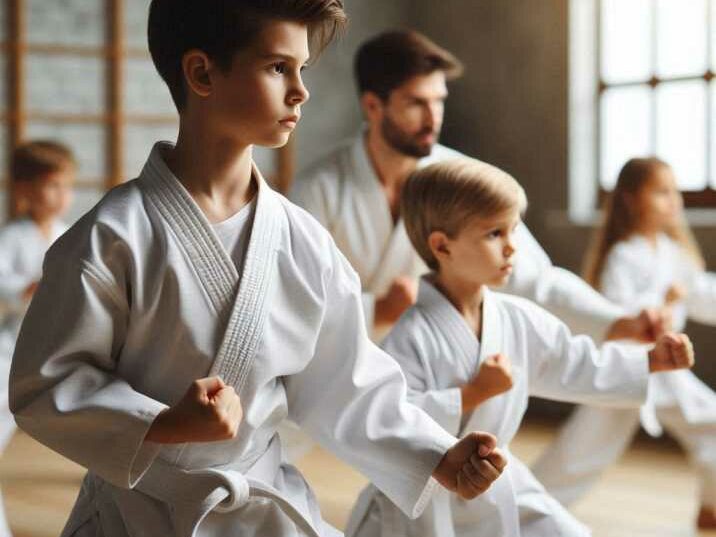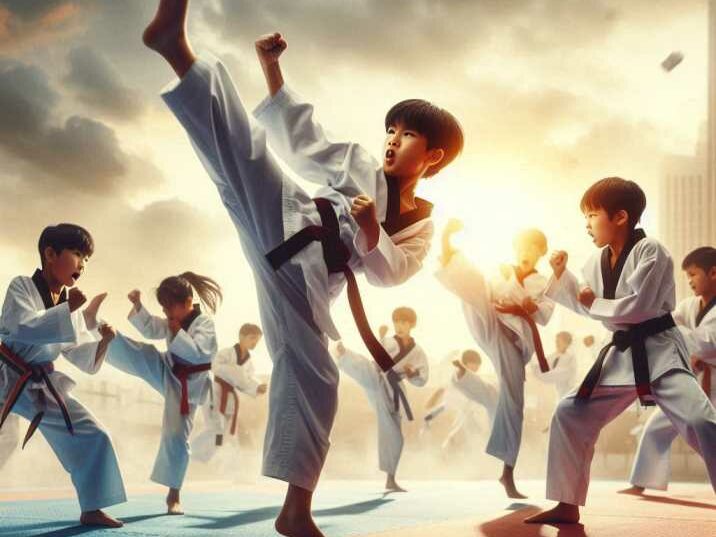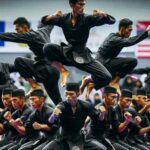Bullying is a serious issue that affects many children, leading to a wide range of emotional and physical problems. Parents often search for effective ways to help their children cope with and combat bullying. One powerful solution is martial arts. So, how can martial arts help kids with bullying? This practice not only equips kids with self-defense skills but also fosters self-confidence, improves physical health, and strengthens the immune system, aiding them in fighting off illness.

Introduction: Martial Arts and Bullying
Table of Contents
How can martial arts help kids with bullying? Martial arts, such as karate, taekwondo, and judo, provide children with practical skills to defend themselves. More importantly, these practices offer comprehensive benefits that extend beyond physical self-defense. Regular martial arts training promotes physical fitness, mental resilience, and a stronger immune system, all of which are crucial for overall well-being and effective bullying prevention.
Building Self-Confidence Through Martial Arts
One of the most significant benefits of martial arts is the boost in self-confidence it provides to children. Through consistent practice and progression in skill levels, children learn to set and achieve goals. Each milestone, such as earning a new belt, reinforces their sense of accomplishment and self-worth.
Detailed Insights:
- Positive Reinforcement: Instructors in martial arts schools often use positive reinforcement to encourage children. This approach helps build a child’s self-esteem and confidence.
- Personal Achievement: The structured progression system in martial arts allows children to see tangible results from their efforts, reinforcing their confidence.
- Overcoming Challenges: Facing and overcoming physical and mental challenges in martial arts helps children develop resilience and a sense of capability.
Tips for Building Self-Confidence:
- Celebrate each milestone and achievement, no matter how small.
- Encourage regular practice and participation in classes.
- Provide positive reinforcement and support at home and in class.
Developing Physical Strength and Endurance
Martial arts are rigorous physical activities that improve strength, flexibility, and cardiovascular health. Regular training helps children develop their muscles, coordination, and overall physical fitness. This physical robustness makes them less likely to be targeted by bullies and more capable of handling physical confrontations if necessary.
Detailed Insights:
- Comprehensive Workout: Martial arts training includes a variety of exercises that work on different muscle groups, ensuring a well-rounded physical development.
- Cardiovascular Health: Regular practice improves heart health and increases stamina, helping children stay energetic and active.
- Flexibility and Agility: Techniques and drills in martial arts enhance flexibility and agility, which are crucial for both self-defense and overall physical fitness.
Tips for Physical Development:
- Ensure consistent training schedules to build endurance and strength.
- Incorporate additional physical activities like running or swimming for overall fitness.
- Maintain a balanced diet to support physical growth and muscle development.
Enhancing Mental Health and Focus
Martial arts require a high level of concentration and mental discipline. Kids learn to focus their minds, control their emotions, and stay calm under pressure. These mental health benefits are crucial in managing the stress and anxiety associated with bullying. Improved focus can also enhance academic performance, providing a dual benefit for children.
Detailed Insights:
- Mindfulness Practices: Many martial arts incorporate elements of mindfulness and meditation, which help in managing stress and anxiety.
- Emotional Control: Learning to control reactions and emotions is a key part of martial arts training, helping children remain composed in stressful situations.
- Goal Setting: Martial arts encourage goal setting and achievement, which can improve motivation and focus in other areas of life, including academics.
Tips for Mental Health Improvement:
- Practice mindfulness and meditation exercises regularly.
- Encourage setting personal goals and working towards them diligently.
- Promote a positive mindset and resilience through daily affirmations and support.
Strengthening the Immune System
Regular exercise, such as martial arts, plays a significant role in strengthening the immune system. Physical activity increases blood circulation, which helps in the efficient distribution of immune cells throughout the body. This enhanced circulation boosts the body’s ability to fight off infections and illnesses. Therefore, kids who practice martial arts are not only defending themselves against bullies but also protecting their health.

Detailed Insights:
- Enhanced Blood Circulation: Exercise increases the flow of blood, which transports immune cells more efficiently throughout the body.
- Reduced Inflammation: Regular physical activity reduces inflammation and promotes better immune response.
- Stress Reduction: Physical activity helps in reducing stress hormones, which can otherwise suppress the immune system.
Tips for a Strong Immune System:
- Maintain a regular exercise routine to keep the immune system active and robust.
- Ensure adequate rest and recovery periods to avoid overtraining and fatigue.
- Provide a nutritious diet rich in vitamins and minerals to support immune health.
Learning Discipline and Respect
Martial arts emphasize discipline and respect, both for oneself and others. These core principles are integral to the practice and help children develop a strong moral foundation. Understanding and practicing discipline can deter aggressive behavior, making children less likely to bully others and more likely to respect their peers.
Detailed Insights:
- Structured Environment: Martial arts classes are structured and require students to follow strict rules and protocols, which instills discipline.
- Respect for Authority: Children learn to respect their instructors and peers, understanding the importance of hierarchy and mutual respect.
- Self-Discipline: Martial arts promote self-discipline through regular practice and adherence to techniques and forms.
Tips for Learning Discipline and Respect:
- Follow the instructor’s guidelines and rules diligently.
- Practice regular self-discipline exercises at home, such as maintaining a schedule or completing chores.
- Encourage respectful behavior in and out of class, reinforcing the values learned in martial arts.
Creating a Supportive Community
Martial arts classes foster a sense of community and belonging. Children form friendships and support networks that can provide emotional and social support. Being part of a community where respect and mutual support are core values can help kids feel secure and less isolated, making them less vulnerable to bullying.
Detailed Insights:
- Peer Support: The camaraderie in martial arts classes provides a support system where children can share experiences and offer encouragement.
- Role Models: Instructors and senior students often serve as positive role models, guiding younger students in their martial arts journey and personal development.
- Sense of Belonging: Being part of a martial arts school gives children a sense of belonging and identity, which can counteract feelings of isolation and insecurity.
Tips for Building a Supportive Community:
- Participate in group activities and events organized by the martial arts school.
- Encourage peer support and teamwork during practice sessions.
- Promote open communication within the community to address concerns and provide mutual support.
Table of Information about How Can Martial Arts Help Kids with Bullying?
| Subtopic | Key Points | Benefits |
|---|---|---|
| Building Self-Confidence | Positive reinforcement from instructors Achieving personal goals and milestones Overcoming physical and mental challenges | Increased self-esteem Better resilience Reduced fear and anxiety |
| Developing Physical Strength | Comprehensive workouts targeting different muscle groups Improved cardiovascular health Enhanced flexibility and agility | Stronger muscles Better endurance and stamina Increased physical robustness |
| Enhancing Mental Health and Focus | Incorporation of mindfulness and meditation Emotional control and stress management Goal setting and achievement | Improved concentration Better stress management Enhanced academic performance |
| Strengthening the Immune System | Enhanced blood circulation Reduced inflammation Reduced stress hormones | Better immune response Increased ability to fight off infections Overall improved health |
| Learning Discipline and Respect | Structured class environment Respect for authority and peers Self-discipline through regular practice | Strong moral foundation Reduced aggressive behavior Improved respect and courtesy |
| Creating a Supportive Community | Peer support and encouragement Positive role models Sense of belonging and identity | Emotional and social support Reduced feelings of isolation Enhanced security and self-worth |
Conclusion
In conclusion, How can Martial Arts help kids with bullying? martial arts can significantly help children with bullying by boosting their self-confidence, developing physical strength, enhancing mental health, and strengthening their immune system. These benefits, combined with the discipline and respect ingrained in martial arts practice, create a holistic approach to combating bullying and promoting overall well-being. As children learn to defend themselves and maintain good health, they become more resilient and capable of facing the challenges that come their way.
By incorporating martial arts into their routine, children gain the tools they need to stand up against bullies and lead healthier, happier lives. If you’re looking for an effective way to support your child in dealing with bullying and boosting their immune system, martial arts might be the perfect solution.
Frequently Asked Questions
1. How often should my child practice martial arts to see benefits?
For optimal benefits, it’s recommended that children practice martial arts at least two to three times a week. Regular practice helps in building physical strength, discipline, and mental focus.
2. Can martial arts help with my child’s academic performance?
Yes, martial arts can improve a child’s focus, discipline, and time management skills, which can translate into better academic performance. The mental clarity and stress relief from martial arts practice can also contribute to better concentration in school.
3. Are there any age restrictions for children to start martial arts?
Most martial arts schools offer classes for children as young as three or four years old. It’s important to choose a program that is age-appropriate and focuses on the developmental stage of your child. Younger children typically start with basic movements and gradually progress to more complex techniques.
4. How can I ensure my child stays motivated in martial arts?
Setting goals, celebrating achievements, and maintaining a consistent practice schedule can keep your child motivated. Positive reinforcement and support from family members also play a crucial role. Encouraging participation in competitions and demonstrations can also boost their enthusiasm.
5. What type of martial arts is best for combating bullying?
Different martial arts offer various benefits. Karate and taekwondo are excellent for self-defense skills, while judo and Brazilian jiu-jitsu are great for learning how to handle physical confrontations. Choosing the right type depends on your child’s interests and specific needs. Consulting with instructors can help determine the best fit for your child.


